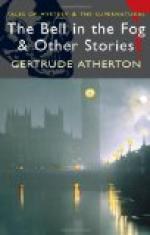“Howdy, howdy, howdy?” he cried, in his rough but hospitable tones. “Glad to see you. Didn’t think you’d come. Yes, I did, though,” with a chuckle. “Well, come down to dinner, I’m hungry.”
He turned his back without individual greeting, and led the way along the hall, then down a narrow creaking stairway to the basement dining-room, an apartment as stark and cheerless as the parlor, albeit the silver on the table was very old and heavy, the linen unsurpassed.
The guests seated themselves as they listed, the youngster almost clinging to Miss Williams. The doctor hurriedly ladled the soup, announcing that he had a notion to let them help themselves, he was so hungry. When he had given them this brief attention he supplied his own needs with the ladle direct from the tureen.
“Old beast!” muttered Mrs. Holt. “It’s disgusting to be so rich that you can do as you please.”
But for this remark, delivered as the ladle fell with a clatter on the empty soup-plate, the first course was disposed of amidst profound silence. No one dared to talk except as the master led, and the master was taking the edge off his appetite.
The soup was removed and a lavish dinner laid on the table. Dr. Webster sacrificed his rigid economic tenets at the kitchen door, but there was no rejoicing in the hearts of the guests. They groaned in spirit as they contemplated the amount they should be forced to consume at one of the clock.
The doctor carved the turkeys into generous portions, ate his, then began to talk.
“Cleveland will be re-elected,” he announced dictatorially. “Do you hear? Harrison has no show at all. What say?” His shaggy brows rushed together. He had detected a faint murmur of dissent. “Did you say he wouldn’t, John Holt?”
“No, no,” disclaimed Mr. Holt, who was a scarlet Republican. “Cleveland will be re-elected beyond a doubt.”
“Well, if I hear of any of you voting for Harrison! I suppose you think I can’t find out what ticket you vote! But I’ll find out, sirs. Mark my words, Holt, if you vote the Republican ticket—”
He stopped ominously and brought his teeth together with a vicious click. Holt raised his wine-glass nervously. The doctor held his note to a considerable amount.
“The Republican party is dead—dead as a door-nail,” broke in an unctuous voice. A stout man with a shrewd time-serving face leaned forward. “Don’t let it give you a thought, doctor. What do you think of the prospects for wheat?”
“Never better, never better. They say the Northern crops will fail, but it’s a lie. They can’t fail. You needn’t worry, Meeker. Don’t pull that long face, sir; I don’t like it.”
“The reports are not very encouraging,” began a man of bile and nerves and melancholy mien. “And this early rain—”
“Don’t contradict me, sir,” cried Webster. “I say they can’t fail. They haven’t failed for eight years. Why should they fail now?”




